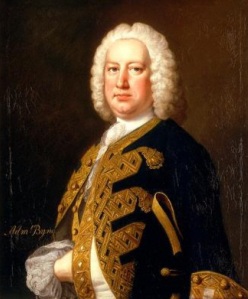March 13, 2007
Gratuitous Royal Navy Geekery Posting

There is a move afoot to urge the pardon of Admiral John Byng, court-marshalled, condemned and shot on his own quarterdeck in 1757.
The admiral, a shy man who never married, was sent to Menorca in March 1756, with 10 ships of the line under orders to prevent the French from capturing the British fort of St Philip's Castle (Port Mahon). But he complained that he had been sent out too late, with too little and historians have suggested the Admiralty woefully underestimated the strength of the French, who had already landed.Faced with the might of enemy ships and the prospect of a British rout, Byng eventually turned the fleet back to Gibraltar without relieving the fort. On his return to Britain, he was court-martialled for breaching the Articles of War. He was found guilty of the charge that "he did withdraw or keep back, and did not do his utmost to take, seize, and destroy the ships of the French king". His death prompted Voltaire's famous remark that the British occasionally shot an admiral "pour encourager les autres".
A campaign for his posthumous pardon has been fought ever since, citing his death as an example of how politicians misuse the Navy.
Lord Torrington, of Mere, Wilts, said yesterday: "I have asked the Defence Secretary to consider the matter because Adml Byng has been judged not guilty by the fullness of time. At the most, he made an error of judgment, but he was in no way a coward. There are not a lot of Byngs left, and it would be nice for the family to say he had been formally pardoned."
Most of the nautical authors I've read (including Patrick O'Brian) suggest that Byng was, indeed, scapegoated. However, moving HM Government to admit that might be a difficult task.


 Image courtesy of the lovely and talented
Image courtesy of the lovely and talented 